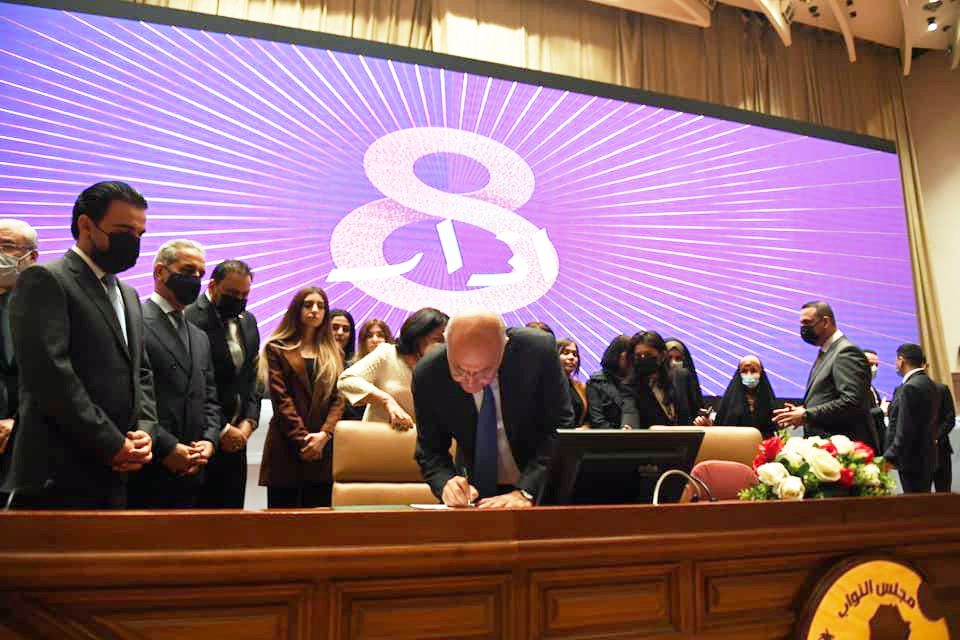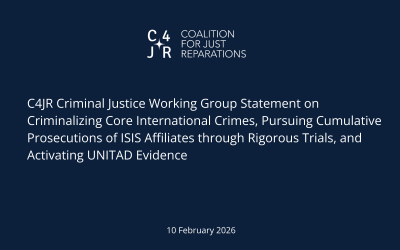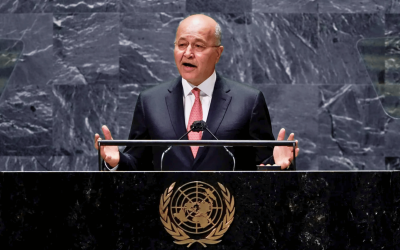Never Again Another ISIS
We should all be united on doing the right thing for our community, and I call them our community. Okay. Politics can make people different, view things differently. But at the end of the day, we should not disagree about reconstruction of Sinjar. We should not disagree about getting people back to their homes. We should not get differences about really putting in place security measures that will protect these areas and never again, another ISIS or something like it could come and terrorize people and subjugate people and do to our girls and our boys and our children and our communities what they did. What happened was awful, was terrible. And we need to learn lessons from it. It’s not just about reparation. We need to do much more. I hope this is just the beginning.
Dr Barham Salih
On March 8 2021, International Women’s Day, President Barham Salih ratified the Yazidi Female Survivors Law, a law enacted in the Iraqi Council of Representatives. This groundbreaking law mandates several critical reparations for survivors of ISIL crimes from Yazidi, Christian Turkmen and Shabak communities.
The Yazidi Survivors Law referred to as the YSL, includes compensation, rehabilitation, land, housing, continued education, employment, recognition of the genocide, criminal prosecutions of perpetrators, the search for those who remain missing, protection of witnesses and survivors and the establishment of a national day of remembrance on August 3. Two years before the Yazidi Female Survivors Law was passed, on March 28 2019, President Barham Salih´s office submitted a Yazidi Female Survivors bill to the Iraqi parliament for review and approval. This initial bill was of great importance in two ways.
First, it was already quite advanced and included various reparative measures. And second, it managed to mobilize a wide movement, including the involvement of Iraqi civil society and survivors, to push for modifications in passing this draft law in the Iraqi parliament.
Jiyan Foundation for Human Rights hosted the following conversation on behalf of the Coalition for Just Reparations (C4JR).
Can you tell us what motivated you and the process behind producing such an advanced first draft that set the framework for the debate by raising the bar from the beginning?
Standing up for the Yazidi communities and for the victims of ISIS is truly a noble cause. [Speaking of] what motivated me to work on this as a priority item. I was elected as president in October 2018. We managed to finalize the draft law by March [2019] and submitted it to the Council of Representatives. In fact, we had to also acquire the support of the government at the time because it had actual implications, [therefore] the presidency could not just push it through. So we had to do a bit of political and bureaucratic work with that. That’s why it took a bit, nearly five months to get this thing through to the Council of Representatives. What motivated me was a sense of responsibility, was a sense of ethics. [Also the] fact that the victims of ISIS, especially the Yazidi girls who were abducted and treated the way that they were, represented the most extreme case of brutality, of man against women against fellow man. As a State of Iraq, as a Muslim, as a Kurd, as a President, as a human being, I felt that we really needed to act. To me, no amount of reparation, no amount of recognition could ever undo the injustice that befalls these people. I hope that this will be the beginning of a process by which we will not only provide reparation from the Iraqi state and the Iraqi authorities, which is a moral responsibility in so many ways towards our own citizens and our own people but also hopefully, the day will come when we are able to galvanize and mobilize serious international efforts [so that] whoever helped ISIS perpetrate these crimes, should pay for these crimes and should be paying reparation for the victims, Yazidis foremost among them, who really have suffered a terrible, terrible ordeal during that period.
I have to recognize also many activists who were talking to me about this, many Yazidis whom I knew, friends and people that I knew from times passed, and we have worked on this. We agreed, even before my election, that should I be elected, this should become a priority.
My wife, and in fact my daughter, who named her daughter Mayan, after Mayan Khatun, the Yazidi Princess or the Yazidi leader who fought. So my connection to the Yazidi community is more than personal, I have to say. The Yazidis represent, really, the most indigenous the most real, the most profound statement about the diversity, and beautiful culture of our land. ISIS represents the other extreme of hate, and bigotry and racism, and fundamentalism. This is the least we could do.
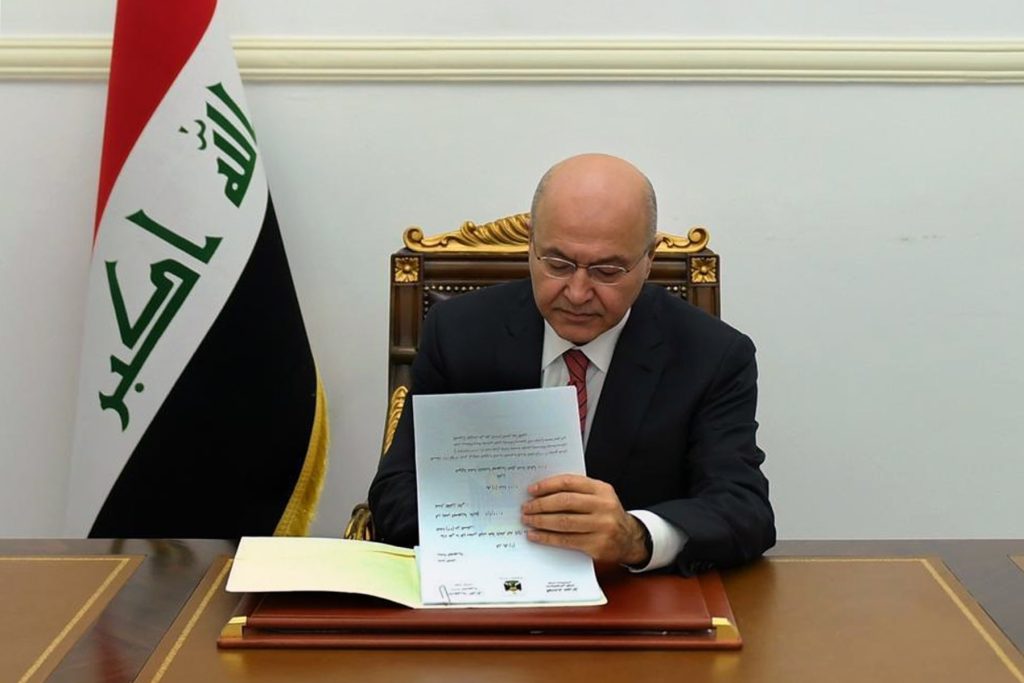
At C4JR we often refer to the fact that your proposal opened a window of opportunity for reparations. Did you or your team anticipate the impact this initial draft would produce, especially in creating spaces and opportunities following the ISIL conflict?
I’ll be honest with you, I’m away from politics. This is the least one can do in any position of authority, to the scale of the time and the calamity that was afflicted to the Yazidis and other Iraqi communities, especially these girls, who represent the purity of life, genuinely so. In humans, and in every sense of the word, this was the manifestation of the extreme barbarity that you could think of. It was the least you could deliver on your moral responsibility and ethical responsibility towards your people, number one. I genuinely, even though when we submitted the initial draft, it included certain other things as well as you can, I mean, Parliament also changed a few things, no doubt. Some of them I did not like, and some of them we had to accept, but nevertheless, they retained the essence of the law. To me, these are minimal requirements of reparation, and nothing can repair the damage afflicted on these people, these victims, nothing, no amount of money. So this was the beginning of a process. To me, knowing or suspecting what was behind ISIS, was not just a merely local phenomenon. There were a lot of actors involved in promoting ISIS and enabling ISIS and empowering ISIS, and tolerating ISIS. I will also say this as a political actor, the complacency and the negligence and the failure to defend these helpless communities are also responsible, legal, and moral. I hope this is the beginning of really that process, the window to provide, to bring all those who helped ISIS, financed ISIS, empowered ISIS, armed ISIS, and tolerated ISIS to pay for the crimes that ISIS committed and to provide more reparation to the victims of ISIS genocide.
Transitional justice and reparations measures, notably compensation, are not new to Iraq. The Iraqi Constitution of 2005 guarantees compensation to the families of martyrs and those injured due to terrorist acts. What lessons did your team integrate from these previous experiences in the course of preparing the original draft
of the Yazidi Survivors Law?
We actually looked at the various avenues, and this was one of the options available to us at the time. We looked at various avenues, legal measures, frameworks, and processes to do this. I personally was committed to doing something unique, specific to the Yazidi girls, the survivors. We could have, I mean, there were some other measures we could do with former victims of Saddam’s regime, but this was such a uniquely barbaric, crime, and the Yazidis throughout history have suffered so much. I thought personally that this needs to be designated directly to them and obviously, Shabak and Turkmen girls who have also been subjected to the same brutality are included in this law and need to be recognized. Their suffering needs to be recognized. Mardin, I was the Prime Minister of the Kurdistan Region in Sulaymaniyah in 2002, before Saddam´s fall. To me, the greatest pain that, even though we were a little government, a small government, we did not have resources, we did not have money, budget, we were really under embargo by Saddam, by the United Nations, by the world at the time, you don’t remember probably, under Saddam regime, it was really tough. I used to go to the camps of the survivors of the Anfal campaign, these ladies in black, together with their children. And every time I go, I’m reminded that even though our resources are limited, even though our ability to help is limited, but what the damn as politics and government is if you cannot help those who have suffered so much, the most vulnerable of your community, moral responsibility, ethical responsibility. One of the greatest pride of my life is that during that period, despite very, very limited resources, we managed to find a chunk of money every month to stash away and we enacted regulations at the time to provide a monthly stipend for the survivors of the Anfal campaign. It was tiny, small compared to the calamity that they had suffered. But it meant a lot to these people it means meant a lot of recognition number one, the state cares about them. And for us to feel responsible. This was later enacted into law and became part of the Anfal Ministry. I hope the KRG will also work on this with the Government of Iraq to further enhance it. So, in response to your question, there were other legal measures to do. I mean, we could have done it through the Martyrs Foundation, for example. But that would have taken away from the uniqueness of the Yazidi case, Yazidi girls, and that crime. We thought that this is the better way of doing it, and it is far better having them go through this and have something unique and specific to their needs.
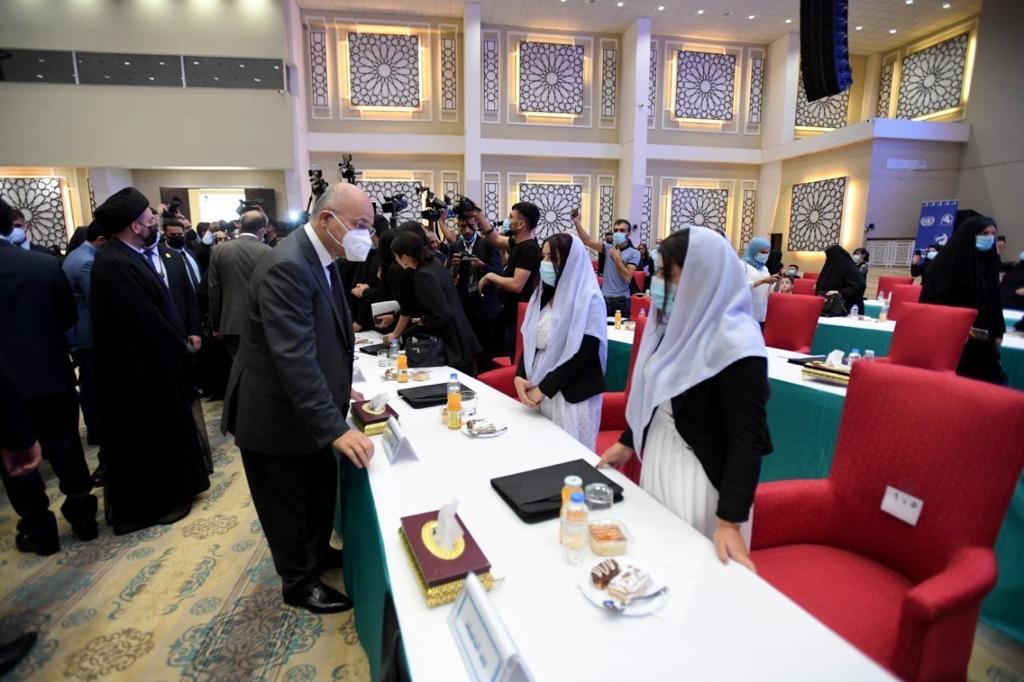
In addition to compensation, the initial draft addresses rehabilitation, restitution, education, land rights, memorialization, and genocide recognition. It even mandates the authorities to prosecute perpetrators and prevent amnesty. With so many important measures, services, and benefits, did you consider the possible implementation challenges due to realities on the ground?
Yes, of course. In fact, a while back, I was speaking to the Director General [of the General Directorate for Survivors Affairs established under the YSL]. Even before I left office, I spoke to her a number of times, including the Minister [of the Federal Ministry for Labor and Social Affairs], who was coming to see me talking about this. Every time I would have a meeting with him, he would come in prepared with his brief about what was being done about the Directorate General. So, bureaucracy is a problem in every country, and in the case of Iraq even more so. Especially in cases like this, where there are some financial issues involved, some people try to defraud the state as well. So you need to protect the victims by providing practical measures that can only make this [YSL benefits] available to the victims, as opposed to those who want to pretend that they are victims and manipulate the system and take away from the resources allocated to this program. So of course, we did anticipate, and I have worked in government, and I had a good team, and we had a good number of advisors and people. We worked with the various ministries to make sure the least bureaucratic problems, but every government has budget issues, has this ministry, that ministry, and administrative routines, and I hate that. At least we do have the DG [General Directorate for Survivors Affairs], we have the office in Nineveh now, and the Director General complains that she does not have enough resources in terms of the number of employees working at her office. I think once the budget is approved, I hope she will be able to get more. She told me a while back that they have about 11 people working full-time on the cases and but there are a lot of demands on them. Of course, there are practical problems. But the scale is big. And I hope that they can do better. I have told her, and I have told the Minister as well, anything I need to do, I remain very committed to this cause, and I can help in any way I am able to. I know the Prime Minister of Iraq, too, is really keen on this. I know the KRG also wants to be helpful as much as it can. I am facilitating this, and this is good. This is a cause that we should all unite on and help implement and get done to people.
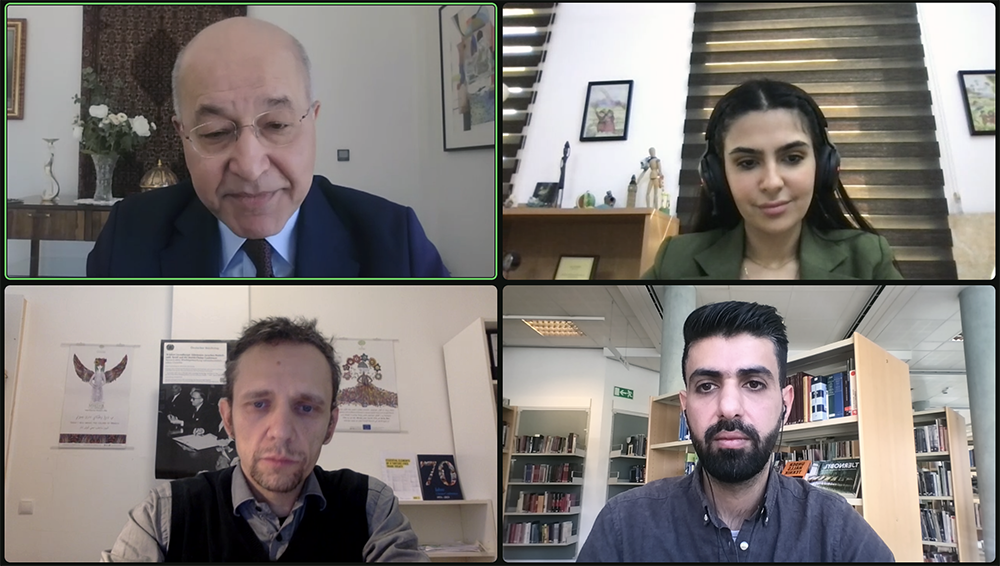
What is your opinion about the final version of the YSL adopted in the parliament? What are its strengths and weaknesses?
I think it’s a good start, definitely a good start. I mean, obviously, the original draft that we submitted was slightly different; in fact, to be fair to Parliament, they have maintained the essence of it. There was some political gimmicking going on during the debates, who is responsible for this and that, we managed to go through with it and get it done. To me, the most important thing about this law, it is the beginning; it has to be looked at as the beginning. There will be no restitution; there will be no reparation unless Sinjar is genuinely reconstructed and rehabilitated until the deportees, the refugees, go back to their homes. I will say something else as well, much more fundamental than that. I go back to history. This is not the first time that the Yazidis have been victimized. They have suffered victimization and marginalization throughout history by different actors, but nothing to the level of extreme brutality that ISIS did.
Nevertheless, Yazidis need to be recognized, Yazidis need to be empowered, Yazidis need to have their own way of expressing the community’s needs, preserve their cultural identity and religious institutions without political interference. That would require much more effort. I hope, this particular law is just the beginning of a better debate.
My hope is that activists of the Yazidi cause are friends, but more importantly, the Yazidi actors themselves. We should all be united in doing the right thing for our community, and I call them our community.
Okay. Politics can make people different, and view things differently. But at the end of the day, we should not disagree about the reconstruction of Sinjar. We should not disagree about getting people back to their homes. We should not get differences about really putting in place security measures that will protect these areas and never again, another ISIS or something like it could come and terrorize people and subjugate people and do to our girls and our boys and our children and our communities what they did. What happened was awful, was terrible. And we need to learn lessons from it. It’s not just about reparation. We need to do much more. I hope this is just the beginning.
Having in mind that the Yazidi Survivors Law is, to a large extent, a legacy of your presidency, can you reflect on its current state of implementation? More precisely, a recently introduced requirement asking survivors to file a criminal complaint through the courts and submit formal investigation documents for their applications to be considered – a procedure which is not mandated within the YSL or its regulations – has made it more difficult for recognized minority components to access their promised reparations, as the application process is now more onerous. We understand that this goes against the spirit and intent of the law, which was designed with relaxed evidentiary standards to ease the application process and mitigate the risk of harm. Can you say more about the original intent?
I am informed that the department is really under a lot of pressure to process applications and that the department is concerned not to allow people who are not genuine victims to manipulate the system. Obviously, there is always a balance between what is right to verify the actual applicants, and whether you are going to make it difficult for people to access the program. I have, as I said, spoken to some people about this. I have seen the argument on both sides, I have to say. Some of them, including some of the Yazidi people, complain that some individuals are not victims and are claiming benefits. So they were complaining that this is not intended for these people. So the way to do it, therefore, to make sure that there is enough verification, enough process to weed out the fraud applicants and so on. But at the same time, we don’t want this to become a painful process for the victims who deserve this. I will follow this matter up with some colleagues and see what is the legal way of doing this thing. But the load on the office is very, very high. The Director General tells me that they expect the Ministry to offer them more assistance by way of allocating more people who work at the office, beyond what they have now. I have pledged to speak to the Governor of Nineveh as well, to follow up. These are mundane issues. I’m sure the Director General is able to follow up many of these things and solve them together with the other people there. But this comes with any type of program like this.
You need to verify the applicants to make sure that the people who [the YSL]is intended for, go for it, but hopefully not to a point where it becomes an impediment, when it becomes too painful for the recipients.
Two years into implementation, there is still no office of the Directorate in Duhok, where most of the eligible survivors currently reside. Do you have any suggestions on how to advance collaboration between the Iraqi Central Government and the KRG on this issue?
This is a federal program, and therefore, the main office is Nineveh, and Sinjar is administratively part of the Nineveh region. Of course, I know many, many survivors are in Dohuk and many Yazidis who have left their homes are living in the Dohuk area, and so on. So it’s only natural for people to expect an office, some office at least, to be opened in Dohuk. I will follow up with the KRG authorities personally on this matter, together with the Minister [of Labor and Social Affairs]and see what is best. I think this is a valid request, and we should follow up on this matter. Thank you for alerting me to this.
The YSL is clear in its focus on minority groups who were disproportionately targeted by ISIL. But of course, ISIL victims come from all religious and ethnic backgrounds. Given your visionary leadership on reparations, what additional measures do you think are needed to ensure that all survivors can receive support?
I think to me, ISIS was a uniquely criminal, extremist organization. Undeniably part of this was locally grown. Undeniably, part of this was a statement of the failure of our security and our political and even our education system that allowed extremists like that to grow. But for ISIS to have emerged the way it has and the way it has swept entire areas, including Sinjar and including Tal Afar, and including Nineveh, and threatening so many other areas of Iraq and Kurdistan region, and so on. ISIS was not alone. There were others who were helping ISIS. So, bringing these criminals to justice is important. But the other outsiders who helped ISIS militarily, and financially, should be held responsible for this crime. Should be made to pay for their crimes. And not only outsiders, some people inside, who were negligent, who failed in their duty to protect these communities. To me, Mardin, talking about reparation for ISIS victims and Yazidi girls by a piece of land, by a monthly pension by whatever this material stuff, is not real reparation. This was a monumental crime, many, many people have been robbed of their lives, of their innocence of everything they had, and there is no way, no amount of reparation can make it up for them. My hope is that with this awful experience, this terrible crime, we could push the case for the criminalization of anyone, not just the ISIS group itself, but anyone who helped them, finance them and make them responsible for these crimes. That’s my hope. And I will be there to help in any way I can.
Finally, what would be your advice to the current President, government, and parliament of Iraq, but also to the Kurdistan Regional Government concerning the implementation of the YSL, and dealing with the past in general?
Get it done, allocate resources, and eliminate the bureaucracy, unless do what I just mentioned as well. Let us work hard on an international campaign to finding the culprits as well and getting them to a court of justice and have them be responsible for the crimes they committed against Yazidis and other Iraqis and the world at large.
You can listen to the Jiyan Podcast here.
